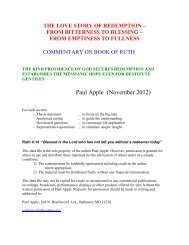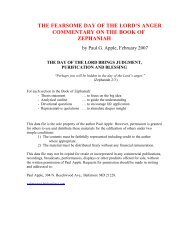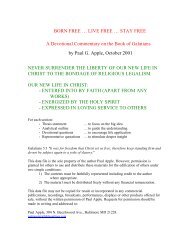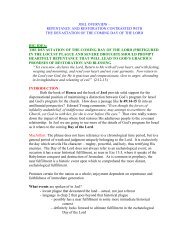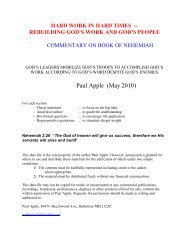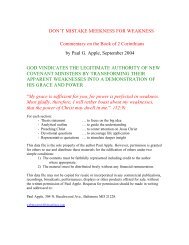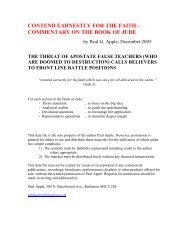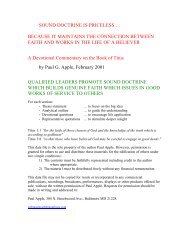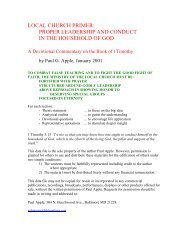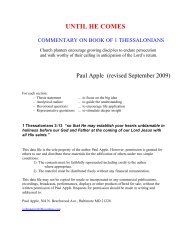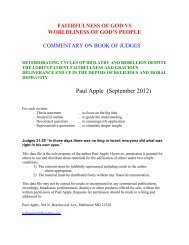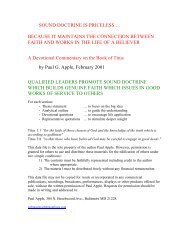in wrath remember mercy . . . the just shall live by faith - Free sermon ...
in wrath remember mercy . . . the just shall live by faith - Free sermon ...
in wrath remember mercy . . . the just shall live by faith - Free sermon ...
Create successful ePaper yourself
Turn your PDF publications into a flip-book with our unique Google optimized e-Paper software.
God based upon certa<strong>in</strong> questions which perplex him. The prophecy is divided <strong>in</strong>to twoparts. The first part, consist<strong>in</strong>g of chapters 1-2, is <strong>the</strong> dialogue between <strong>the</strong> prophet andGod concern<strong>in</strong>g <strong>the</strong> Lord’s announcement of <strong>the</strong> approach<strong>in</strong>g judgment upon s<strong>in</strong>fulJudah at <strong>the</strong> hands of <strong>the</strong> Ba<strong>by</strong>lonians. The second section, chapter 3, is a prayer <strong>in</strong> <strong>the</strong>form of a psalm. The psalm is a remembrance of <strong>the</strong> mighty works of <strong>the</strong> Lord <strong>in</strong> <strong>the</strong>past for His people, and a prayer for <strong>the</strong> Lord to revive His work on behalf of Israel.Gaebele<strong>in</strong>: There is profound significance <strong>in</strong> <strong>the</strong> fact that God gave one of <strong>the</strong> verygreatest of all spiritual <strong>in</strong>sights – “<strong>the</strong> <strong>just</strong> <strong>shall</strong> <strong>live</strong> <strong>by</strong> his <strong>faith</strong>” (Hab. 4:2b) – to a manwho cried out to Him aga<strong>in</strong>st <strong>in</strong><strong>just</strong>ice and violence. For Habakkuk <strong>the</strong>re was no<strong>in</strong>compatability between impassioned concern for social righteousness and <strong>the</strong> <strong>faith</strong> <strong>by</strong>which a man is <strong>just</strong>ified. In this prophet’s perplexity, God revealed to him <strong>the</strong> moralpattern of history that tyranny and oppression are self-destroy<strong>in</strong>g but that <strong>faith</strong> <strong>in</strong> <strong>the</strong> Lordis life-giv<strong>in</strong>g. God showed this concerned man how He would use <strong>the</strong> Ba<strong>by</strong>lonians as ascourge to punish <strong>the</strong> wickedness of His people and <strong>the</strong>n how He would require <strong>the</strong>Ba<strong>by</strong>lonians for <strong>the</strong>ir cruelty. His ultimate response to Habakkuk’s perplexity about <strong>the</strong>problem of evil came through <strong>the</strong> great <strong>the</strong>ophany described <strong>in</strong> <strong>the</strong> third chapter of <strong>the</strong>book. In it God showed <strong>the</strong> prophet someth<strong>in</strong>g we too need to know – that <strong>the</strong> div<strong>in</strong>elogic <strong>in</strong> answer<strong>in</strong>g our profoundest problems transcends our human reason.Hefl<strong>in</strong>: It is better to <strong>live</strong> <strong>in</strong> <strong>faith</strong> than <strong>in</strong> rebellion, trust<strong>in</strong>g God when answers are not tobe found, liv<strong>in</strong>g a life of <strong>faith</strong>fulness even when evil seems to have <strong>the</strong> upper hand. Thisapproach to life is wise because God is <strong>the</strong> omnipotent ruler; He will ultimately prevailover evil.Major Theological Themes:The great issue with which Habakkuk struggles is <strong>the</strong>odicy. How could a <strong>just</strong> and holyGod allow evil to exist? How could He rema<strong>in</strong> <strong>in</strong>active and silent <strong>in</strong> <strong>the</strong> face of brutality,<strong>in</strong><strong>just</strong>ice, and atrocious <strong>in</strong>humanity? Though <strong>in</strong>tellectual answers for <strong>the</strong> problemultimately give way to experiential answers, Habakkuk does <strong>in</strong> fact learn severalsignificant <strong>the</strong>ological truths:1) First, he learns that God and good will <strong>in</strong>evitably triumph. . . God’s people must be await<strong>in</strong>g people, liv<strong>in</strong>g with <strong>the</strong> certa<strong>in</strong> hope that eternity will clarify <strong>the</strong> issues, reveal<strong>in</strong>g<strong>the</strong> triumph of right.2) Second, Habakkuk learns that evil conta<strong>in</strong>s <strong>the</strong> seed of destruction (2:4-20).Individuals and nations who <strong>live</strong> <strong>in</strong> pride, arrogance, and self-sufficiency f<strong>in</strong>d <strong>in</strong> <strong>the</strong> end<strong>the</strong>se very attitudes are <strong>the</strong>ir undo<strong>in</strong>g. Though on occasion evil appears to have <strong>the</strong> upperhand, it is really filled with death and destruction. It cannot and will not endure <strong>in</strong> God’smoral universe. Its transitory nature is an unalterable fact of history.3) Third, <strong>the</strong> prophet learns that those who are right with God are to <strong>live</strong> <strong>by</strong> <strong>the</strong>ir<strong>faith</strong>fulness (2:4).



